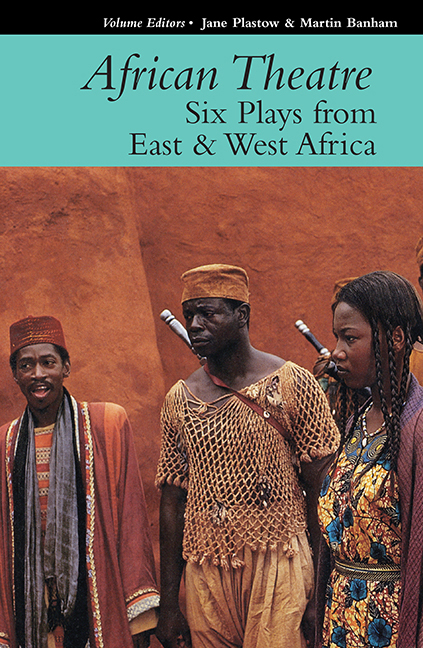Book contents
- Frontmatter
- Contents
- Notes on Contributors
- Obituary: Adieu Alain Ricard
- Preface
- THREE PLAYS FROM EAST AFRICA
- The translation & transcription of transcription of Mother Uganda & Her Children
- Mother Uganda & Her Children
- The context & making of Rose Mbowa's Mother Uganda & Her Children
- Majangwa: A Promise of Rains
- Notions of indigeneity: Uganda's Robert Serumaga
- The Guest (Engida): A One Act Play
- An Absurdist in Addis Ababa: Manyazewal Endeshaw's Engida
- THREE PLAYS FROM WEST AFRICA
- Book Reviews
The translation & transcription of transcription of Mother Uganda & Her Children
from THREE PLAYS FROM EAST AFRICA
Published online by Cambridge University Press: 24 August 2019
- Frontmatter
- Contents
- Notes on Contributors
- Obituary: Adieu Alain Ricard
- Preface
- THREE PLAYS FROM EAST AFRICA
- The translation & transcription of transcription of Mother Uganda & Her Children
- Mother Uganda & Her Children
- The context & making of Rose Mbowa's Mother Uganda & Her Children
- Majangwa: A Promise of Rains
- Notions of indigeneity: Uganda's Robert Serumaga
- The Guest (Engida): A One Act Play
- An Absurdist in Addis Ababa: Manyazewal Endeshaw's Engida
- THREE PLAYS FROM WEST AFRICA
- Book Reviews
Summary
I think we normally underestimate the value of preservation. Organizing the transcription and translating of Mother Uganda and Her Children made me realize just how much of an issue this is for Ugandan theatre. Firstly, I was thrilled when Jane Plastow contacted me about the translation. I had heard so much about Professor Rose Mbowa while I was studying theatre at Makerere University, and participating in preserving one of her works has been an absolute pleasure. When I watched the broken bits of the recording of the play – a poor quality and partial VHS tape transferred onto DVD – I was even more excited. I thought to myself; this is going to be easy, and fun. Although I was right about the latter, I was very wrong about the former.
The play centres around folk songs and dances from ten languages and sub-regions from across the country including West Nile, Acholi, Buganda, Busoga, Samia, Bugisu, Ankole, Kigezi, Karamoja and Bunyoro. However, although this was a large number, I was confident I could find people who spoke those languages easily. Uganda is a place that prepares you for such diversity, being such a daily canvas of multiple ethnic groups.
The first step I made was to contact a friend of mine who teaches at the Performing Arts and Film Department at Makerere University, Ms Lillian Mbabazi. She put me in touch with people from the Dance and Music sections who spoke most of the languages from the regions mentioned above. I contacted them and this was a very good start. I wanted to contact musicians because I believed they would understand the folk music best, many having investigated local music cultures. It was also a consideration that the poor quality of the recording meant it was likely that experts would most easily recognize and be able to translate the songs.
Apart from a few of these academics who were incredibly helpful, the rest were very busy and we had very few weeks to get the work done. I moved from one contact to another, meeting dead ends everywhere. Sometimes a person would take the work home and after a few days call back to say they couldn't hear a single discernible word.
- Type
- Chapter
- Information
- Publisher: Boydell & BrewerPrint publication year: 2017

